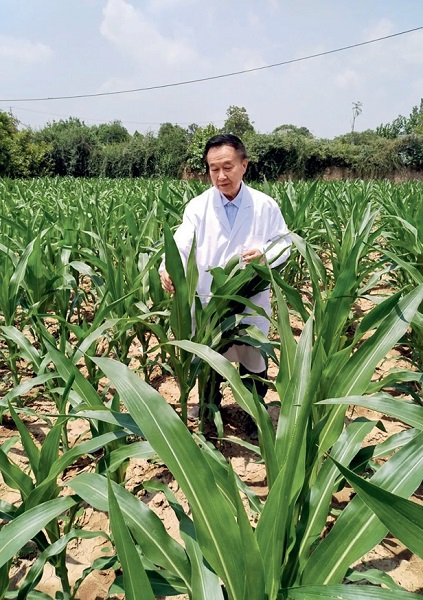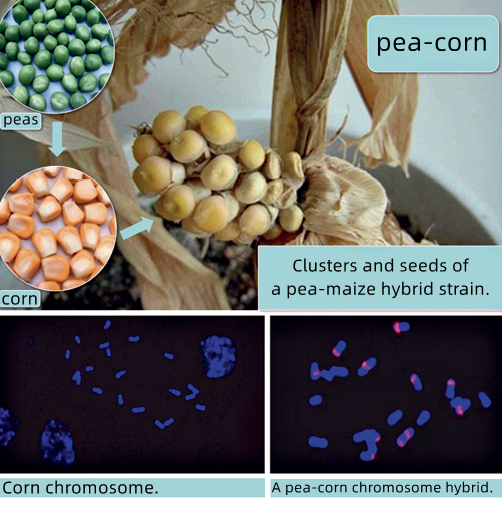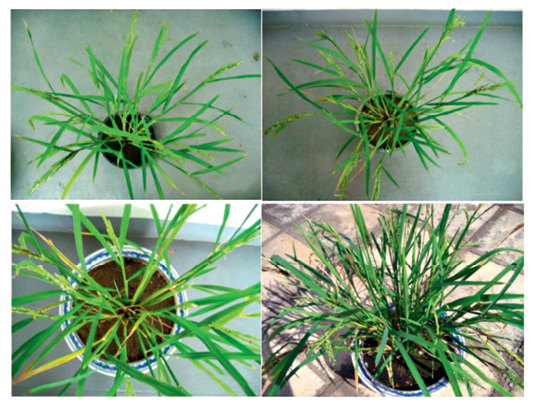
China's food security can only be safeguarded when seed resources are firmly held in our own hands, Chinese President Xi Jinping pointed out during his inspection in Hainan Province in April this year. Xi has emphasized the importance of maintaining independence in seed sources in order to ensure China’s food security, adding that the country must have full control over its seed sources and be self-reliant on technologies related to the seed industry.
Professor Zhu Peikun, founder of Shenzhen Bioroad Biotechnology Co., Ltd., is a forerunner of plant chromosome hybridization. His study focuses on creating new varieties and new germplasms of high-quality and high-yield crops, and has led to a major breakthrough in the development of agriculture and seed industry.
Zhu once taught and engaged in scientific research at Fudan University for more than eight years. He was also a visiting scholar at the University of Minnesota, a visiting expert at the University of Alaska, and a senior scientist in several biotechnology companies in the U.S. He became a visiting research professor at the Hong Kong University of Science and Technology in 1999.
The Ministry of Agriculture and Rural Affairs this year has identified chromosomal hybridization, pollination, and grafting as an important technical means of plant crossbreeding. Nine grain and oil crop varieties created by Zhu through the application of chromosomal hybridization technology have been certified by the ministry. China is the first to obtain hybrid chromosomes and related genes with biological functions in interclass hybrid plants.
A New Technology
Legend has it that Shennong, the originator of ancient Chinese agriculture, found that five cereals can not only satisfy hunger, but also make people stronger and healthier, so he taught people to grow grains. But for thousands of years, before Zhu’s invention, people were unable to hybridize these five grains, rice was rice and millet was millet.
As a result of the continuous advancement of human civilization, the demand for food is increasing. Scientists have been working on the development of higher plants to obtain higher-yield and higher-quality crops.
Pollination is the earliest and most common plant hybridization technique. In addition, grafting is also a method that is popular across the world to improve plant varieties. China began to use grafting technology thousands of years ago according to records from the Tang (618–907) and Song (960–1279) dynasties. There are many ways to improve plants, such as somatic hybridization by protoplast fusion and genetic modification.
Zhu has devoted his life to the research of plant chromosome hybridization technology, a type of hybridization that is not limited by the relationship between species.
Organisms can be organized into seven major levels of classification: kingdom, phylum, class, order, family, genus, and species (from broadest to narrowest). The higher the level, the broader the biological relationship is. Chromosome hybridization can break the inter-class, inter-phylum, and even inter-kingdom barriers, so as to realize the no-species limitation of distant hybridization.
In the past, hybridization usually occurred between different varieties of the same species. Zhu’s research focuses on introducing a chromosome from one plant species into the cells of another distant species, in order to produce a new type of plant with a hybridized chromosome. Theoretically, with this technology humans can crossbreed any two species of higher plants to produce a new plant variety. So far, Zhu has created new varieties by combining pairs such as peas and corn, flax and corn, and purple perilla and rice.

New Plants
Based on his years of theoretical research, Zhu believes that under certain conditions, exogenous chromosomes of different species and their fragments can be introduced into suitable plant recipient cells, thereby forming a new type of hybrid chromosomes through chromatin hybridization with the chromosomes in the recipient cells. This hybrid chromosome carries three genes: the gene of the recipient, the gene of the donor, and the gene of the hybrid. As long as these genes are stably expressed, different varieties or subspecies or even species can be artificially created.
In the late 1970s, aphids were wreaking havoc on vegetable crops in Shanghai. During Zhu’s research at the time, he noted aphids’ strong aversion to the smell of garlic, and so set about crossbreeding to introduce the genetic elements responsible for the smell into leafy vegetables. His book Chromosome Hybridization in Higher Plants, published in 2011, offers an academic insight into the related theory and achievements.
In the past, hybridization often meant the pollination crossbreeding between different varieties within the same plant species. Zhu’s technology introduces the chromosomes of one plant into the recipient cells of another plant for chromosome hybridization. Through differentiation and cultivation of the hybrid chromosome cells, a new type of plant with hybrid chromosomes can be formed. In this way this technology can create various new types of plants that humans need.

Eleusine indica (sorghum-paddy) during its different growing periods.
Milestones in Research
“Zhu’s technology is an epoch-making breakthrough in China’s development of main food crops and biological breeding after the hybrid rice breeding technology invented by Yuan Longping. It is also a new milestone on the journey of invention and innovation of global plant hybrid breeding technology,” said Pan Jianian, former deputy director of the Department of Agriculture of Guangdong Province, who likened the technology to “5G technology in China’s agriculture and seed industries.” According to him, plant chromosome hybrid technology is an invention with independent intellectual property rights and strategic significance that China is leading the world in the field of plant hybrid breeding.
This invention of Zhu has attracted the attention of scientists in Western countries. Philip Larson, head of the plant pathology department at the University of Minnesota more than three decades ago, spoke highly of his invention, predicting that once it was widely applied, it would cause a new “green revolution.” Nowadays the theory and technology of chromosome hybridization in the West is still lacking, while Chinese scientists have achieved remarkable achievements in this field.
Shenzhen Bioroad Biological Chromosome Hybridization Institute, China’s first plant chromosome hybridization research institute, was established in 2008, fully reflecting the emphasis China has placed on plant crossbreeding technology. “The promotion and application of the cutting-edge technology of plant chromosome hybrid breeding should be elevated to the level of national strategy, and practical and powerful measures should be taken to support and develop the plant chromosome hybridization,” said Pan.
Taking flax-maize as an example, this is a new variety with flax chromosomes inserted into the chromosomes of maize recipient cells. It contains more linolenic acid, linoleic acid, and corn oil, which improves the yield and quality of corn oil. It is estimated that the oil content is not less than 20 percent. This variety has been tested in Suqian, Jiangsu Province. From the appearance, flax-corn variety has produced huge corn cobs, and the seeds are shiny and oily.
A new staple food variety obtained by crossing spartina anglica chromosomes with chromosomes in rice cells has been planted in heavily saline-alkali land in Kenli County, Shandong Province, where the soil salinity is 3.636 percent, higher than the average salinity of ocean water, which is about 3.5 percent. It produces more than 6,000 kilograms of good-quality rice per hectare. And it can improve the saline-alkali soil year by year as well as the local ecological environment.
The upland rice obtained from the hybridization of sorghum chromosome and rice cell chromosome can be directly planted in dry land. Needing no irrigation during the entire life cycle, it is more drought-resistant than corn, and can produce a large amount of rice by relying on rainwater or drip irrigation.
Zhu has been cooperating with the research team of the Agricultural Sciences Institute in Tongchuan City, Shaanxi Province since 2007. They have developed more than 10 hybridized combinations such as flax-corn. For a flax-corn hybrid, the content of r-linolenic acid and linoleic acid increases by 46.4 percent and 14.3 percent respectively compared with corn. The protein content of the soybean-wheat combination is 15.96 percent higher than that of wheat. “Fifteen years of in-field cooperation has proved that the hybrid combination created by chromosome hybridization technology can optimize the nutritional quality of staple crops,” said Zhang Yajian, director of the Agricultural Sciences Institute.
According to Wu Shenghua, a famous black rice researcher, plant chromosomal hybridization will open up a new era for plant crossbreeding. This technology has crossed the genetic barrier of plant hybridization that has been insurmountable for thousands of years. Once combined with conventional breeding, it will greatly strengthen China’s seed industry.
According to Yuan Shichou, former deputy director of the academic committee of Beijing Academy of Agriculture and Forestry Sciences, the significance of Zhu’s technology in biology is unparalleled so far, because it solves the problem of the randomness and pertinence of breeding by combining theory and practice.
In Zhu’s opinion, personal power is limited and insignificant. He hopes that the country will build a national research institute to cultivate superior staple food crops and oil crops, and apply the advances in plant chromosome hybridization as soon as possible in its grain and oil crop germplasm innovation in order to promote global food security. 
Through differentiation and cultivation of the hybrid chromosome cells, a new type of plant with hybrid chromosomes can be formed. In this way this technology can create various new types of plants that humans need.
